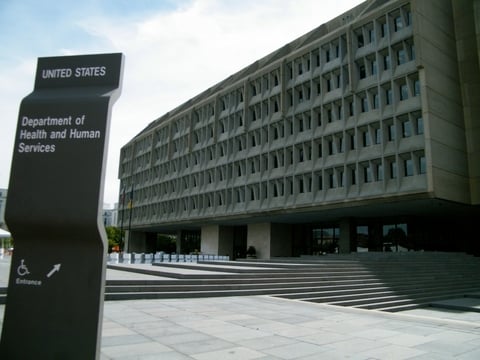HHS Secretary Alex Azar said the healthcare industry's transition to value-based care is a central focus for the department under his leadership, and he said the agency wants to work with payers to accelerate the changes.
The Department of Health and Services is planning a four-pronged "agenda" to tackling value-based care, and will especially be pushing for increased price transparency, he said.
"I believe you have a right to know what a healthcare service will cost—and what it will really cost—before you get that service," Azar said in remarks at a health policy event hosted Thursday by America's Health Insurance Plans. "This is a pretty simple principle. We'll work with you to make it happen—and lay out more powerful incentives if it doesn't."
RELATED: The move to value-based care is inevitable, says AMGA's new president Jerry Penso

Azar said at a press briefing Thursday afternoon that HHS' value-based care agenda is in the early stages, saying it's a "stake in the ground" for care transformation.
He declined to name specific incentives the agency might offer to encourage payers to be more transparent with their prices, but said the agency would consider pushing for both regulatory and legislative options.
Medicare's power to lead in this space is a crucial incentive for other payers on the regulatory side, he said, adding that HHS and the Centers for Medicare & Medicaid Services will take advantage of Medicare and Medicaid's influence to drive change in the industry.
RELATED: How CMS plans to 're-evaluate' its relationship with insurers to drive patient-centric data sharing
"We can certainly look at legislative action if there are things we feel we don't have authority to drive," Azar said at the briefing. "My passions are quite great around patient out-of-pocket understanding."
An example of Medicare leading the way, Azar said, is CMS' plans to leverage its current relationships with private payers to facilitate greater data-sharing. Improved interoperability can further the transition to greater value in care, Azar said at the AHIP event.
Patients ought to have control of their records in a useful format, period. When they arrive at a new provider, they should have a way of bringing their records, period. Read my full #AHIPPolicy remarks on #HealthIT, #interoperability, & more: https://t.co/dg4U1wjgRW pic.twitter.com/FsqoAxwCN4
— Alex Azar (@SecAzar) March 8, 2018
Azar also said HHS is planning to address "government burdens" that may be barriers to more integrated and collaborative healthcare, and that includes reexamining regulations, such as price reporting rules in Medicare and Medicaid and current interpretations of various antifraud protections.
"We also want to look at burdens we're placing on insurers specifically," Azar said. "We know the amount of time and money that goes into complying with well-meaning but often byzantine rules and regulations regarding consumer communications."
At the briefing, Azar said "modifying the rules of the road" could cause a disruption of existing commercial relationships. But, he said, speaking as someone who operated a business in the past, anticipating those issues makes them easier to navigate.
"If you are nimble, agile and forward-thinking [it's] not something to fear, but actually an opportunity to move there and get to that place sooner," Azar said.